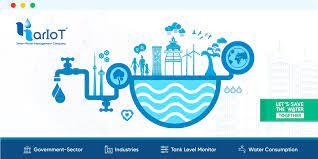How Smart Water Management is Transforming Water Conservation

In a world where water scarcity is becoming a growing concern, there’s an urgent need for innovative solutions to ensure sustainable water usage. Enter smart water management a technology-driven approach that helps monitor, manage, and conserve water more effectively. By using cutting-edge tools like IoT sensors, smart meters, and data analytics, this approach is revolutionizing the way we interact with and preserve our most essential resource: water.
What is Smart Water Management?
Smart water management refers to the use of advanced technologies and data-based systems to optimize water distribution, monitor usage, and ensure its sustainable consumption. It goes beyond traditional water management by incorporating real-time monitoring and control, enabling more efficient and targeted interventions to reduce water waste and improve overall water quality.
Core Technologies Behind Smart Water Management
-
IoT Sensors: Internet of Things (IoT) sensors are placed within water systems to collect real-time data about water flow, pressure, quality, and potential leakages. These sensors transmit data to a central system for analysis and action.
-
Smart Water Meters: Unlike conventional water meters, smart meters provide real-time data on water usage patterns. This enables users to detect leaks early, monitor consumption, and reduce wastage.
-
AI and Predictive Analytics: Artificial Intelligence (AI) can analyze vast amounts of data collected from water systems. AI helps predict water demand, identify issues like leaks or contaminations, and optimize water distribution.
-
Cloud-Based Management Systems: Cloud platforms act as the control center for smart water management. Data from sensors and smart meters is collected, analyzed, and stored in the cloud, allowing for remote monitoring and real-time decision-making.
Why is Smart Water Management Important?
-
Addressing Water Scarcity: Freshwater resources are depleting due to overuse, population growth, and climate change. Smart water management helps conserve water by identifying areas of wastage and ensuring efficient distribution.
-
Reducing Water Loss: Globally, billions of gallons of water are lost each year due to leaks in water supply systems. Smart sensors and meters can detect these leaks early, preventing unnecessary water loss.
-
Ensuring Water Quality: Smart water systems can monitor water quality in real time. By detecting contaminants early, these systems ensure that clean and safe water reaches consumers.
-
Optimizing Water Use in Agriculture: Agriculture is one of the largest consumers of water. With the help of smart irrigation systems, farmers can optimize water use by irrigating crops only when necessary, based on real-time data like soil moisture and weather conditions.
Key Benefits of Smart Water Management
-
Efficient Water Usage: By tracking water usage in real time, consumers and industries can reduce water consumption, ensuring it is used only when necessary. This leads to both environmental and cost benefits.
-
Leak Detection: Water leakage is a major issue for municipalities and industries. With smart water management systems, leaks can be detected early, leading to quick repairs and reduced water wastage.
-
Cost Savings: Real-time monitoring of water usage helps households and businesses reduce their water bills. Smart water meters provide detailed reports on consumption, encouraging users to adopt more water-efficient practices.
-
Sustainability: Implementing smart water management systems contributes to long-term sustainability by promoting water conservation, reducing wastage, and minimizing environmental impact.
-
Increased Resilience: Smart water management can improve the resilience of water systems to challenges like droughts or infrastructure failures by providing real-time insights and predictive maintenance alerts.
Applications of Smart Water Management
-
Municipal Water Systems: Smart water systems help municipalities monitor water distribution networks, detect leaks, and manage water pressure. This leads to a more reliable and efficient water supply for urban populations.
-
Agriculture: Smart irrigation systems allow farmers to use data-driven insights to water their crops efficiently. This not only saves water but also enhances crop yields by ensuring optimal watering conditions.
-
Industries: Large-scale industries that rely on water for their operations can use smart water management systems to monitor water usage and improve efficiency. This leads to both cost savings and reduced environmental impact.
-
Residential: Smart water meters can be installed in homes to monitor daily water usage. Homeowners can receive alerts about abnormal usage, helping them detect leaks early and promote water conservation.
Challenges in Implementing Smart Water Management
-
Initial Investment Costs: Setting up smart water management systems can involve significant upfront costs for infrastructure, IoT devices, and cloud services. However, the long-term savings and benefits often outweigh these initial expenses.
-
Data Privacy and Security: Since smart water systems rely heavily on data collection and analysis, ensuring the privacy and security of that data is a top priority to prevent unauthorized access or cyberattacks.
-
Integration with Existing Systems: For municipalities or industries with outdated infrastructure, integrating smart water management technologies can be challenging. Proper planning and phased implementation can address this issue.
-
Lack of Technical Expertise: Operating and maintaining smart water systems requires technical know-how. Water management authorities need to invest in training and upskilling staff to handle the new technologies.
Conclusion
The integration of technology into water management through smart water management systems offers immense potential for improving efficiency, reducing wastage, and promoting sustainable water use. Whether in urban settings, agriculture, or industries, these systems provide the insights needed to make smarter decisions about water usage, helping to conserve one of the planet’s most vital resources.
By embracing smart water technologies, communities can take a significant step toward addressing water scarcity, ensuring water security, and building a more sustainable future for generations to come.
- Art
- Causes
- Crafts
- Dance
- Drinks
- Film
- Fitness
- Food
- Games
- Gardening
- Health
- Home
- Literature
- Music
- Networking
- Other
- Party
- Religion
- Shopping
- Sports
- Theater
- Wellness
- IT, Cloud, Software and Technology


